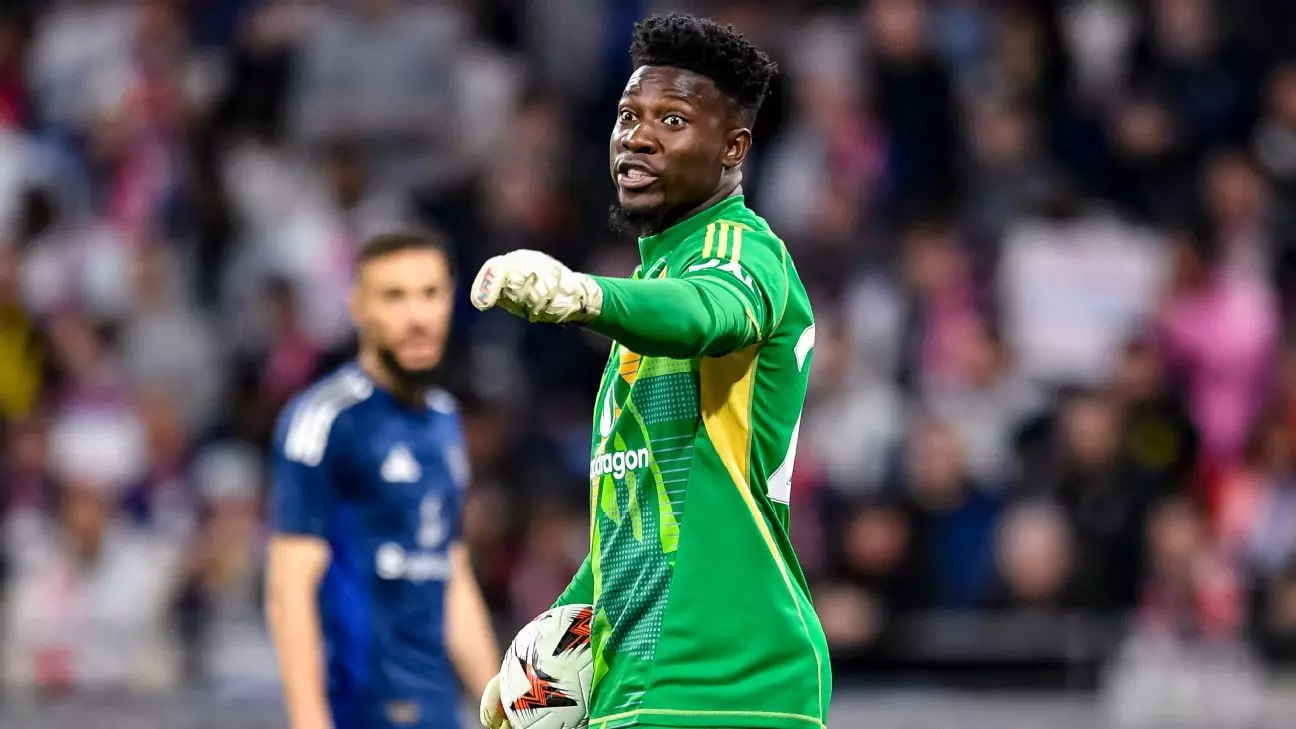In the high-stakes environment of European football, every player’s performance is scrutinized, but few felt the weight of expectation and scrutiny like André Onana on that fateful Thursday evening in Lyon. As a thrilling quarterfinal clash in the UEFA Europa League unfolded, the narrative quickly shifted from a promising showdown between Lyon and Manchester United to a personal saga that would haunt Onana. Amid chants of derision and moments of self-inflicted injury to his professional reputation, Onana’s blunders painted a picture of despair so vivid it could overshadow the tactical brilliance of the match itself.
The Cost of Mistakes
At its core, football is a game of errors, but not all mistakes carry the same weight. Onana’s dual gaffes—the first being an embarrassment as he misjudged a free kick that soared over him into the net—came at a critical juncture. His errors not only gifted Lyon two vital goals but also left his teammates grappling with the mental impact of conceding under such circumstances. The air of confidence that Manchester United had built over the season was suddenly punctured, and the team’s morale took a visible hit, exacerbated by the raucous atmosphere in Lyon’s Groupama Stadium.
Moreover, these blunders couldn’t have been timed worse for Onana, who had recently ignited a war of words with his opponent, Serbian midfielder Nemanja Matić, regarding the relative stature of their teams. Instead of reinforcing his claims with a flawless performance, Onana’s miscalculated confidence exposed a player still wrestling with the intricacies of high-pressure situations on a grand stage.
A Tactical Clash Played on Personal Grounds
The tension between Onana and Matić was palpable, morphing a routine football match into a personal encounter of subtle digs and overt confrontations. When Matić quipped that Onana might be “one of the worst goalkeepers in United’s history,” it added an unexpected layer to the narrative. Such verbal exchanges can often be seen as part of the competitive spirit inherent in top-tier football; however, the reality was that Onana had placed himself squarely in the crosshairs of his opponents’ psychological warfare.
Football, much like war, is fought on many fronts. Onana’s failure to maintain composure under the gaze of the Lyon crowd—hurling chants aimed directly at him—reflected not just poor goalkeeping, but a vulnerability that was exploited multiple times throughout the match. Meanwhile, while his colleagues, including Leny Yoro and Joshua Zirkzee, attempted to rally, Onana’s struggles were inescapable, almost casting a shadow over their contributions.
Coaching Perspective: The Blind Faith in Onana
Ruben Amorim, the United manager, showcased a perplexing sense of optimism in the face of adversity, attributing Onana’s mistakes to the fallibility of human nature—an admirable sentiment, but perhaps misguided in this scenario. While Amorim’s philosophy emphasized resilience and understanding, there comes a time when faith must be tempered with accountability. The waiting game for a goalkeeper to regain form is far from ideal in high-pressure knockout football, where every moment counts and misjudgments can spark elimination.
Amorim’s belief that “there’s nothing I can say to Andre in this moment” highlights the dichotomy facing managers; a need to protect their players while navigating the harsh realities of performance. Yet, as a coach, Amorim’s duty extends beyond mere camaraderie. The defending champion’s faith appears almost blind, a dangerous outlook when your spot in the semifinals hangs precariously in the balance.
The Bigger Picture: Redemption or Regret?
As the final whistle sounded and the match concluded in a 2-2 draw, the focus shifted to the second leg at Old Trafford. Lyon would advance with confidence, buoyed by their home performance. For Onana, redemption is dangling tantalizingly out of reach—a chance to leave mistakes behind and reclaim his standing not just in the eyes of a critical fanbase, but in his own understanding of self-worth as a person and a professional.
The looming pressure ahead of the second leg is storms of its own making. An underwhelming follow-up performance from Onana could send ripples through the already fragile structure of Manchester United’s season. Each match becomes a tightrope walk; slip again, and the fall could be catastrophic—not just for the team’s ambitions but for Onana’s career, which was already teetering on the edge of potential peril.
As this thrilling saga unravels, one question remains: can André Onana seize his moment of reckoning, transforming potential into performance, or will his fate solidify into the annals of what could have been?

Leave a Reply